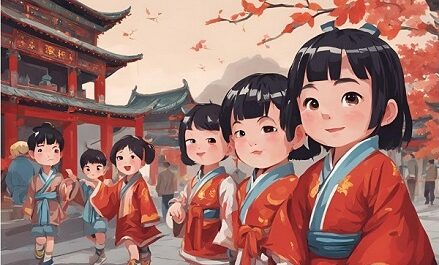Learn Chinese Idiom with Pinyin and English
- Idiom in Chinese-子女玉帛。
- Pinyin of Idiom– zǐ nǚ yù bó.
- Idiom’s Meaning in English– The idiom “子女玉帛” refers to the deep affection and high regard that parents hold for their children and possessions, particularly jade and silk. It expresses the sentiment that one’s offspring and belongings are invaluable and should be cherished and protected with utmost care.
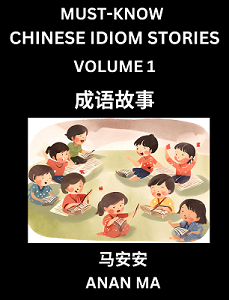
Chinese Idiom Stories Books (HSK All Levels):
- Books to Learn Chinese Idiom Stories (Part 1)
- Books to Learn Chinese Idiom Stories (Part 2)
- Books to Learn Chinese Idiom Stories (Part 3)
Learn Chinese Idiom Story in English (成语故事的英文)
Although the idiom “zǐ nǚ yù bó” does not have a specific ancient story attached to it, we can create a modern tale to illustrate its meaning.

In a small town, there lived a devoted couple who had a darling daughter named Xiaohong. They also possessed a precious jade and silk piece, a family heirloom, which they treasured deeply. The couple cherished both Xiaohong and the jade and silk with utmost care, ensuring that she grew up healthy and happy while also safeguarding the heirloom from any harm.
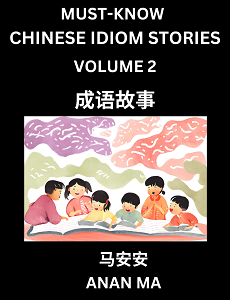
One day, a devastating fire broke out in the town. Without hesitation, the couple rushed into the inferno, first rescuing Xiaohong and then struggling valiantly to save the jade and silk. Their actions exemplified the sentiment behind the idiom “zǐ nǚ yù bó,” showcasing the profound affection and esteem parents hold for their offspring and possessions.
Learn Idiom Story in Chinese (成语故事)
虽然“子女玉帛”这个成语并没有一个确切的古代故事与之直接对应,但我们可以编造一个现代的故事来解释这个成语的含义。
在一个小镇上,有一对深爱着彼此的夫妇。他们有一个可爱的女儿,名叫小红,还有一块祖传的玉帛,被视为家族的宝贝。夫妇俩非常珍视这两样东西,他们不仅悉心照料小红,让她健康成长,还精心保护着那块玉帛,不让它受到任何损害。
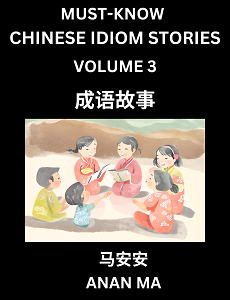
有一天,镇上发生了一场大火,夫妇俩毫不犹豫地冲进火海,先是把小红救了出来,然后又拼尽全力去抢救那块玉帛。他们的行动展现了“子女玉帛”这个成语所蕴含的父母对子女和财产的深深珍视。
Learn Keywords with English, Simplified Chinese Characters, and Pinyin (关键词)
- 子女 (zǐ nǚ): offspring
- 玉帛 (yù bó): jade and silk (symbolizing possessions)
- 珍视 (zhēn shì): cherish
- 财产 (cái chǎn): possessions
- 火海 (huǒ hǎi): inferno
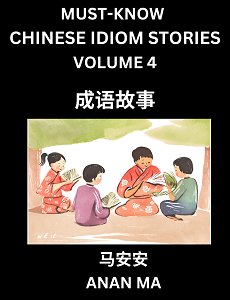
Pinyin of Idiom Story (故事的拼音)
Suīrán “zǐnǚ yùbó” zhège chéngyǔ bìng méiyǒuyīgè quèqiè de gǔdài gùshì yǔ zhī zhíjiē duìyìng, dàn wǒmen kěyǐ biānzào yīgè xiàndài de gùshì lái jiěshì zhège chéngyǔ de hányì.
Zài yīgè xiǎo zhèn shàng, yǒu yī duì shēn àizhe bǐcǐ de fūfù. Tāmen yǒu yīgè kě’ài de nǚ’ér, míng jiào xiǎo hóng, hái yǒu yīkuài zǔchuán de yùbó, bèi shì wéi jiāzú de bǎobèi. Fūfù liǎ fēicháng zhēnshì zhè liǎngyàng dōngxī, tāmen bùjǐn xīxīn zhàoliào xiǎo hóng, ràng tā jiànkāng chéngzhǎng, hái jīngxīn bǎohùzhe nà kuài yùbó, bù ràng tā shòudào rènhé sǔnhài.
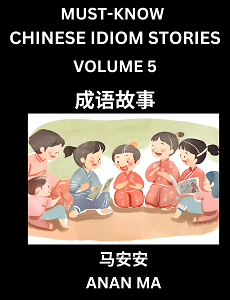
Yǒu yītiān, zhèn shàng fāshēngle yī chǎng dàhuǒ, fūfù liǎ háo bù yóuyù de chōng jìn huǒhǎi, xiānshi bǎ xiǎo hóng jiùle chūlái, ránhòu yòu pīn jìn quánlì qù qiǎngjiù nà kuài yùbó. Tāmen de xíngdòng zhǎnxiànle “zǐnǚ yùbó” zhège chéngyǔ suǒ yùnhán de fùmǔ duì zǐnǚ hé cáichǎn de shēn shēn zhēnshì.




